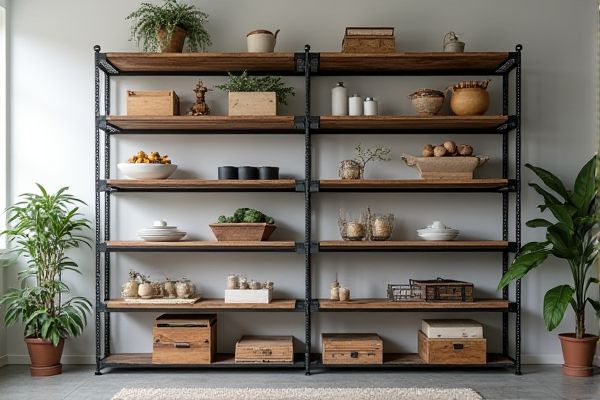
Vented shelves allow for better air circulation and temperature control, making them ideal for environments where moisture buildup or heat is a concern, whereas solid metal shelves provide a sturdier surface for heavy-duty storage and protect sensitive items from dust and debris. Explore the rest of the article to discover which shelving option best suits Your specific storage needs.
Table of Comparison
| Feature | Vented Shelves | Solid Metal Shelves |
|---|---|---|
| Material | Metal with perforations or mesh | Solid metal sheets |
| Airflow | Enhanced airflow, reduces moisture and heat buildup | Limited airflow, can trap heat and moisture |
| Weight Capacity | Moderate to high, depends on design | High, supports heavy loads |
| Durability | Good, corrosion-resistant options available | Very durable, often heavy-duty |
| Applications | Electronic equipment, food storage, drying racks | Heavy tools, industrial storage, bulk items |
| Maintenance | Easy to clean, less dust accumulation | Easy to clean but may trap dust on flat surfaces |
| Cost | Generally less expensive | Typically more expensive due to solid construction |
| Safety | Better visibility and ventilation | Provides more containment, less risk of small items falling |
Introduction to Vented and Solid Metal Shelves
Vented shelves feature perforations or slots that enhance air circulation, making them ideal for environments requiring ventilation or moisture control, such as data centers and industrial storage. Solid metal shelves provide robust support and protection for stored items, offering superior strength and resisting dust or spills, which suits warehouses and heavy-duty applications. Choosing between vented and solid metal shelves depends on specific needs for airflow, weight capacity, and environmental conditions in storage settings.
Key Differences Between Vented and Solid Shelves
Vented shelves feature perforations or slots that enhance air circulation, making them ideal for environments requiring ventilation or temperature control, such as server rooms or storage of moisture-sensitive items. Solid metal shelves offer superior strength and provide a flat, stable surface for heavy or uniform items, making them suitable for industrial storage or warehouses. The choice between vented and solid shelves depends on factors like airflow needs, weight capacity, and the type of items stored.
Advantages of Vented Metal Shelves
Vented metal shelves offer superior airflow, preventing moisture buildup and reducing the risk of rust or corrosion on stored items. Their design enhances visibility and allows dust to fall through, making cleaning easier and maintaining a cleaner storage environment. You benefit from improved ventilation, which extends the lifespan of materials and supports better organization in industrial or commercial settings.
Benefits of Solid Metal Shelving
Solid metal shelving offers superior strength and durability, making it ideal for heavy-duty storage needs in industrial and commercial environments. Its solid surface prevents dust accumulation and provides a stable platform for storing small items and sensitive equipment. The seamless design enhances cleanliness and hygiene, often required in medical and food storage settings.
Airflow and Moisture Control Comparison
Vented shelves enhance airflow by allowing air to circulate freely, reducing moisture buildup and preventing mold or rust in storage areas. Solid metal shelves, while sturdy, restrict airflow and can trap moisture, increasing the risk of condensation and corrosion. Choosing vented shelves is ideal for environments requiring optimal ventilation and moisture control.
Load Capacity and Durability Factors
Vented shelves typically offer better air circulation and moisture resistance but generally have lower load capacity compared to solid metal shelves, which provide superior strength and can support heavier weights. The durability of solid metal shelves is enhanced by their continuous surface, making them less prone to bending or warping under heavy loads, while vented shelves may be more vulnerable to structural weakness if overloaded. Selecting between vented and solid metal shelves depends on balancing the need for ventilation against the requirement for maximum load-bearing durability.
Maintenance and Cleaning Requirements
Vented shelves facilitate easier maintenance and cleaning by allowing dust and debris to fall through, reducing accumulation on surfaces compared to solid metal shelves. Solid metal shelves often require more frequent wiping to remove dust buildup and are prone to showing smudges or stains. Both types benefit from regular cleaning, but vented shelves typically reduce time spent on maintenance in settings like commercial kitchens or warehouses.
Ideal Applications for Vented Shelving
Vented shelves are ideal for applications requiring airflow and moisture control, such as storing electronics, food products, or chemicals that benefit from ventilation to prevent heat buildup and condensation. Your choice of vented shelving supports environments like commercial kitchens, warehouses with temperature-sensitive inventory, and industrial settings where dust prevention and air circulation enhance product longevity. These shelves promote cleaner, cooler storage conditions compared to solid metal shelves, which are better suited for heavy-duty storage or items needing flat, stable surfaces without ventilation.
Best Uses for Solid Metal Shelves
Solid metal shelves offer superior durability and strength, making them ideal for heavy-duty storage in industrial, garage, or warehouse settings. Their impermeable surface protects against dust, dirt, and moisture, ensuring your items remain clean and secure, perfect for storing tools, machinery parts, or sensitive electronics. Choosing solid metal shelves enhances your storage solution when consistent protection and heavy load capacity are essential.
Choosing the Right Shelving for Your Needs
Vented shelves offer superior air circulation, making them ideal for environments requiring temperature control and moisture reduction, such as kitchens and warehouses storing perishable goods. Solid metal shelves provide robust support and prevent smaller items from falling through, suited for heavy-duty storage and organizing tools or equipment. Selecting the right shelving depends on your specific storage needs, considering factors like ventilation requirements, weight capacity, and item size to optimize efficiency and safety.
 homyna.com
homyna.com